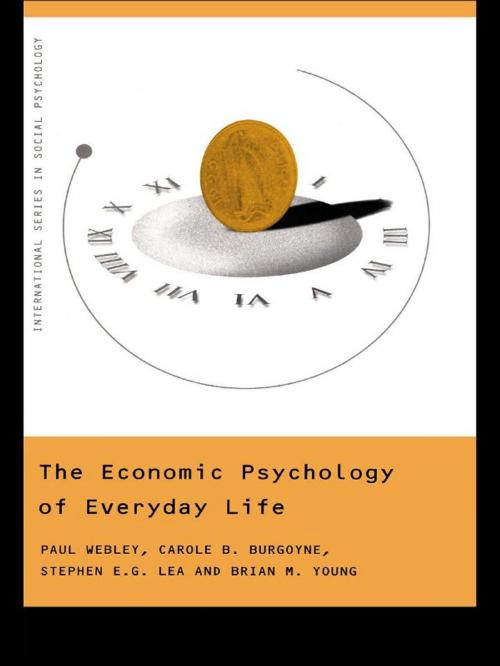The Economic Psychology of Everyday Life
Nonfiction, Health & Well Being, Psychology, Social Psychology| Author: | Paul Webley, Carole Burgoyne, Stephen Lea, Brian Young | ISBN: | 9781134659715 |
| Publisher: | Taylor and Francis | Publication: | January 4, 2002 |
| Imprint: | Psychology Press | Language: | English |
| Author: | Paul Webley, Carole Burgoyne, Stephen Lea, Brian Young |
| ISBN: | 9781134659715 |
| Publisher: | Taylor and Francis |
| Publication: | January 4, 2002 |
| Imprint: | Psychology Press |
| Language: | English |
From childhood through to adulthood, retirement and finally death, The Economic Psychology of Everyday Life uniquely explores the economic problems all individuals have to solve across the course of their lives.
Webley, Burgoyne, Lea and Young begin by introducing the concept of economic behaviour and its study. They then examine the main economic issues faced at each life stage, including:
* the impact of advertising on children
* buying a first house and setting up home
* changing family roles and gender-linked inequality
* redundancy and unemployment
* coping on a pension * obituaries, wills and inheritance.
Finally they draw together the commonalties of economic problems across the lifespan, discuss generational and cultural changes in economic behaviour, and examine the significance of other, non-economic constraints, upon individuals.
The Economic Psychology of Everyday Life provides a much-needed comprehensive and accessible guide to economic psychology which will be of great interest to researchers and students.
From childhood through to adulthood, retirement and finally death, The Economic Psychology of Everyday Life uniquely explores the economic problems all individuals have to solve across the course of their lives.
Webley, Burgoyne, Lea and Young begin by introducing the concept of economic behaviour and its study. They then examine the main economic issues faced at each life stage, including:
* the impact of advertising on children
* buying a first house and setting up home
* changing family roles and gender-linked inequality
* redundancy and unemployment
* coping on a pension * obituaries, wills and inheritance.
Finally they draw together the commonalties of economic problems across the lifespan, discuss generational and cultural changes in economic behaviour, and examine the significance of other, non-economic constraints, upon individuals.
The Economic Psychology of Everyday Life provides a much-needed comprehensive and accessible guide to economic psychology which will be of great interest to researchers and students.















